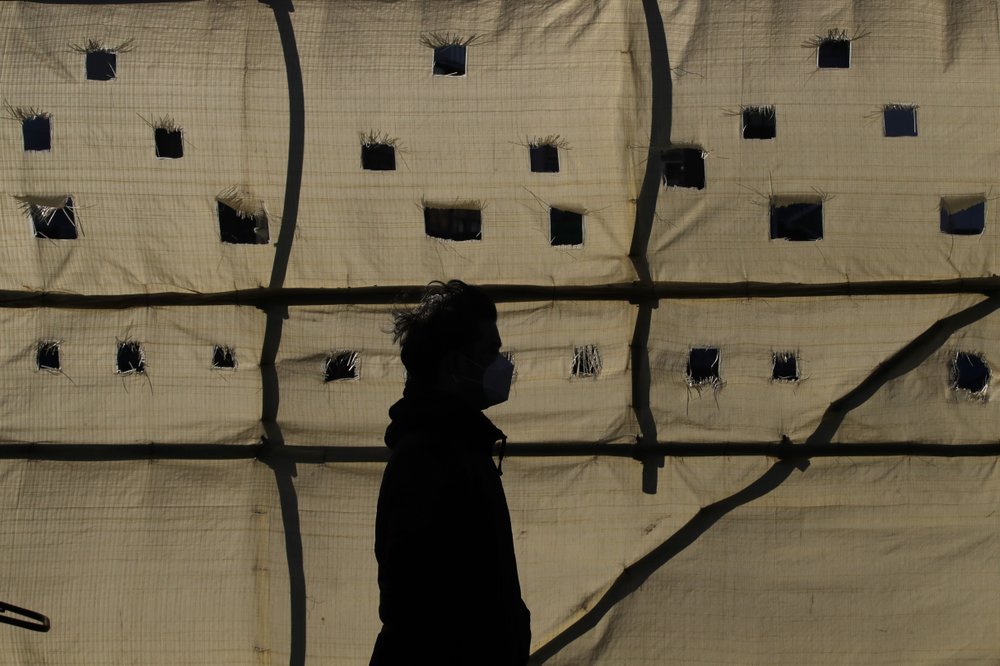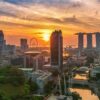A man wearing a face mask as a precaution against the coronavirus is silhouetted as he walks past a construction site in Seoul, South Korea, Wednesday, Dec. 16, 2020. (AP Photo/Lee Jin-man)
SEOUL, South Korea (AP) — South Korea has added more than 1,000 infections to its coronavirus caseload for the second straight day amid growing fears that the virus is spreading out of control in the greater capital area.
The Korea Disease Control and Prevention Agency on Thursday said the COVID-19 death toll was now at 634 after 22 patients died in the past 24 hours, the deadliest day since the emergence of the pandemic. Among 12,209 active patients, 242 are in serious or critical condition.
Nearly 800 of the 1,014 new cases were reported from the densely populated Seoul metropolitan area, where health officials have raised alarm about a looming shortage in hospital capacities. Thursday marked the 40th consecutive day of triple digit daily jumps, which brought the national caseload to 46,453.
The viral resurgence came after months of pandemic fatigue, complacency and government efforts to breathe life into a sluggish economy.
Officials are now mulling whether to raise social distancing restriction to maximum levels, which could possibly include bans on gatherings of more than 10 people, shutting tens of thousands of businesses deemed non-essential and requiring companies to have more employees work from home.
Elsewhere in the Asia-Pacific region:
— The World Health Organization says the coming COVID-19 vaccines will not end the pandemic quickly and countries of the Western Pacific region are not guaranteed to have early access to the shots. WHO Regional Director Dr. Takeshi Kasai says the vaccines are not “a silver bullet that will end the pandemic in the near future.” He says, “The development of safe and effective vaccines is one thing. Producing them in adequate quantities and reaching everyone who needs them is another.” While some countries that have independent vaccine purchase agreements might start vaccination campaigns in the coming months, others could see vaccination begin in the middle or late 2021, said Dr. Socorro Escalante, WHO’s coordinator for essential medicines and health technologies. “It’s important to emphasize that most, if not all, the countries in the Western Pacific region are a part of the COVAX Facility,” said Escalante. COVAX was set up by WHO, vaccines alliance GAVI and CEPI, a global coalition to fight epidemics, in an effort to ensure equitable access to vaccines across the world. WHO representatives also urged that high-risk groups should be prioritized for vaccination as vaccines will only be available in limited quantities.
— Tokyo reported 822 new cases of the coronavirus, a new high for the Japanese capital. Infections have been on the steady climb nationwide for several weeks. Japan on Friday reported 2,988 new cases for a total of 187,103, including 2,739 deaths. Experts on the Tokyo task force raised caution levels for the medical systems to the highest, suggesting that most Tokyo hospitals have little extra manpower or beds to continue their ordinary treatment for other patients. “We must stop further acceleration of the infections,” Tokyo Gov. Yuriko Koike said. “In order to prevent serious cases and deaths and save the medical systems from collapsing, I ask for everyone to cooperate.” Koike said Tokyo is extending an early closure request for drinking places, which was to end Thursday, through mid-January. Norio Ohmagari, director of the Disease Control and Prevention Center, said that the number of daily cases could exceed 1,000 within weeks. About half of the cases are no longer traceable as infections are transmitted at homes, offices and schools, experts said. Prime Minister Yoshihide Suga, apparently reluctant to further damage businesses already hit by the pandemic, has been slow to take steps. After repeated calls from experts, Suga last Friday announced plans to suspend the government’s travel promotion campaign from Dec. 28 to Jan. 11 following media surveys showing a sharp decline in his approval ratings.
— Authorities are searching for the source of an emerging COVID-19 cluster in Sydney’s northern coastal suburbs. Australia’s largest city had gone 12 consecutive days without community transmission until Wednesday, when a driver who transported international air crews in a van to and from Sydney Airport tested positive for the coronavirus. By Thursday, six people had been infected with the virus though community transmission in Sydney, as well as six returned travelers who had been infected overseas and tested positive while in hotel quarantine. The new infections include a woman who works at the Pittwater Palms aged care home, which has since been closed to visitors. A drummer in a band that had played in several clubs around Sydney in recent days has also been infected.
— The Australian Open men’s tennis tournament will begin three weeks later than planned on Feb. 8 because of the pandemic. The ATP said that men’s qualifying for the season’s first Grand Slam tournament is being moved to Doha, Qatar, from Jan. 10-13. That will be followed by a period of about 2 1/2 weeks set aside for travel to Melbourne and a 14-day quarantine period for players and their coaches or other support staff. Other tournaments that will not take place next year include the New York Open and an event in Auckland, New Zealand. The ATP is looking for new dates for the Rio Open, which was supposed to begin Feb. 17 but now conflicts with the two-week Australian Open main draw. As with other sports, tennis was disrupted this year because of the COVID-19 outbreak, including several months with no competition, the postponement of the French Open’s start from May to September, and the cancelation of Wimbledon for the first time since World War II.
— New Zealand’s economy has bounced back close to where it was before the coronavirus hit after GDP rose by a record 14% in the third quarter. The rise followed a record 11% drop in the second quarter and a small drop in the first quarter, according to Statistics New Zealand. In the year to September, GDP declined by 2.2%. Leading the rebound in the third quarter were goods-producing industries, up 26%, and service industries, up 11%. New Zealand has eliminated community spread of the virus, at least for now, and many aspects of life have returned to normal. The nation’s borders, however, remain shut.
Copyright 2020 Associated Press. All rights reserved.









































